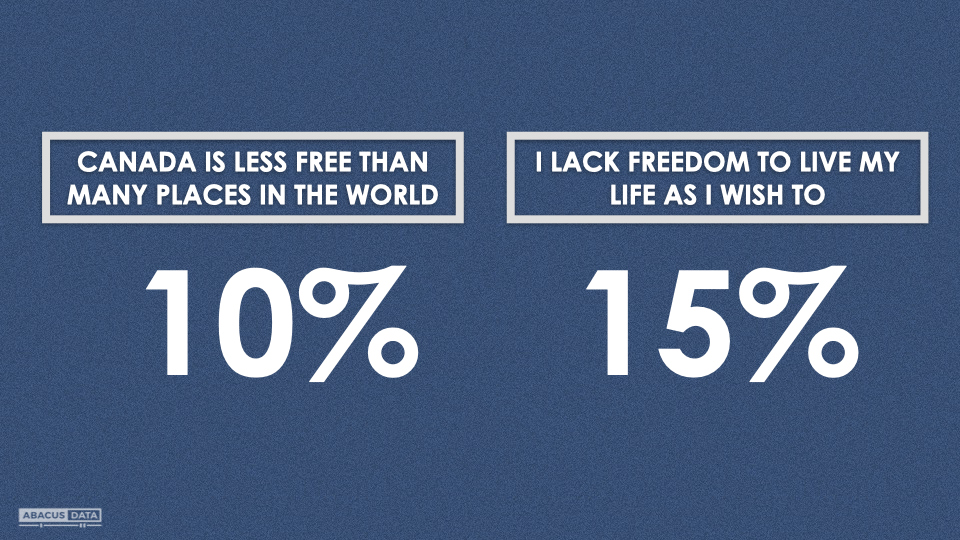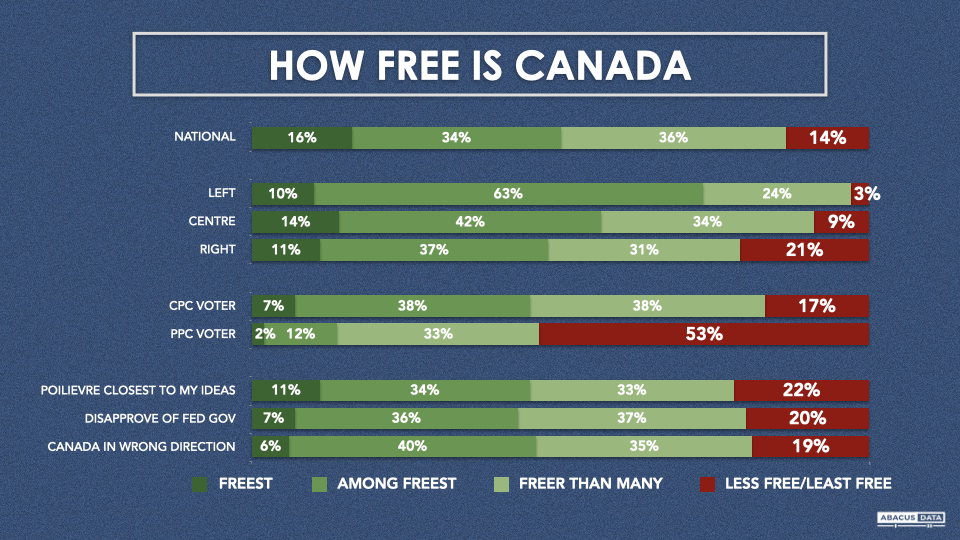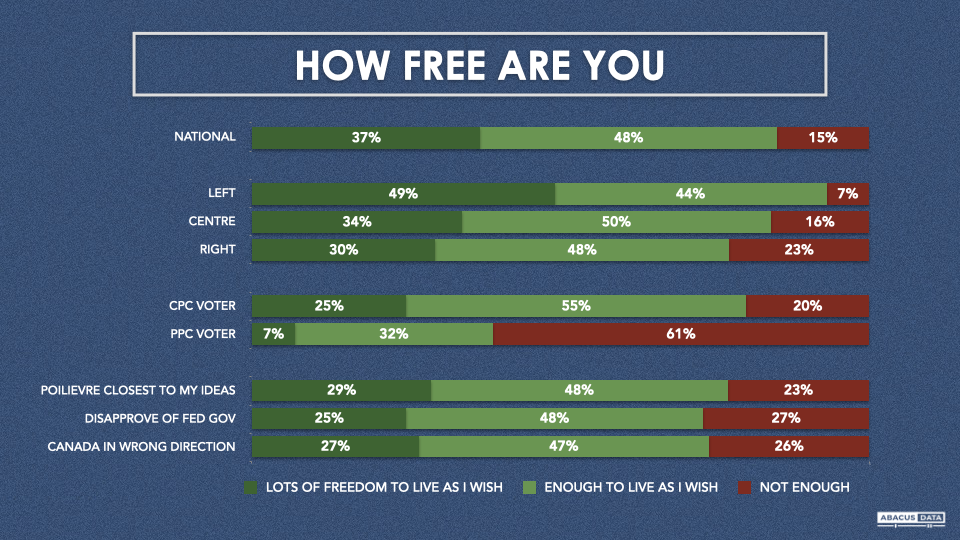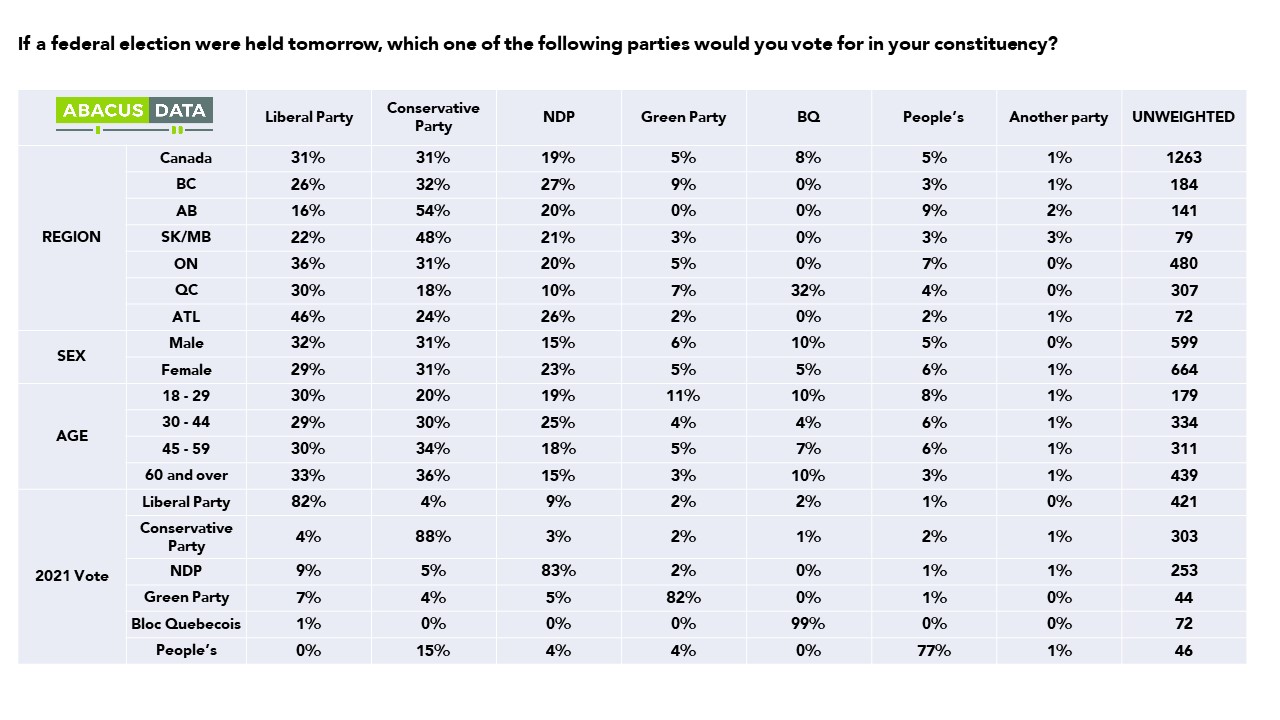What do Canadians think about the level of freedom in Canada?
May 28, 2022
Our latest nationwide public opinion survey asked Canadians a couple of questions about the topic of freedom, to test the resonance of Conservative leadership candidate Pierre Poilievre’s campaign promise to “make Canada the freest country in the world”.
The results suggest that the promise might not lack some pulling power, as the large majority of those we surveyed indicated that they felt Canada was relatively free already:
- 12% say that Canada is the freest country in the world today
- 47% say Canada is one of the freest countries in the world
- 30% say Canada today is pretty free compared to many other places
That totals 89% who seem to feel that Canada is not particularly short on freedom, while a much smaller group (10%) felt otherwise:
- 6% say Canada today is less free than many other places
- 4% say Canada is one of the least free countries in the world

We also asked people if they felt they had enough freedom to live their own lives as they saw fit. Again a large majority indicated that they were not lacking in freedom:
- 37% said they had lots of freedom to live their life as they wish
- 48% said they had enough freedom to live their life as they wish
- 15% said they did not have enough freedom to live as they wish
To fully understand the resonance of Mr. Poilievre’s message it is important to examine subgroup differences, including among the partisans he is attempting to win support among. Here is what our examination of those breakdowns found.
Canada’s freedom compared to other places:
- 21% of those who self-describe as on the right of the spectrum, and 17% of current CPC voters, think Canada is less free than many other places.
- Alberta is the province where the largest number of people see a lack of comparative freedom in Canada, but even there that view is only held by 18%
- 54% of People’s Party voters believe Canada lacks freedom
- Among those who feel Poilievre is the candidate who best reflects their values and ideas, only 22% think Canada trails other places in terms of freedom.

Personal freedom to live as I wish:
- 23% of those who self-describe as on the right of the spectrum, and 20% of current CPC voters, say they lack the freedom to live as they wish.
- Alberta and Ontario are the provinces where the largest number of people see a lack of personal freedom, but that view is only held by 17%
- 61% of People’s Party voters feel they lack the personal freedom to live as they wish
- Among those who think Poilievre is the candidate who best reflects their values and ideas, only 23% feel they lack personal freedom.
- Among those who disapprove of the federal government only 27% feel they lack personal freedom
- Among those who think Canada is headed in the wrong direction, 26% think they lack personal freedom.

UPSHOT
Conservative front runner Pierre Poilievre has based his campaign on tapping into a sentiment that is in somewhat short supply – the idea of Canada as a place where freedom is imperilled.
However, the ‘freedom’ pitch is about three times more resonant with supporters of the People’s Party than it is among supporters of the Conservative Party.
It may well be that the Poilievre strategy is based on drawing in and energizing those who would consider voting either Conservatives or People’s Party – and that strategy may turn out to be successful in a leadership race, where the goal is to get members to sign up and vote.
At the same time, it’s interesting to note that among Canadians in general – and even among a broader cross-section of those who vote Conservative – the message of more freedom is a bit like pushing string – people don’t feel it is solving a problem either in Canada or in their lives.
METHODOLOGY
The survey was conducted with 1,500 Canadian adults from May 20 to 24, 2022. A random sample of panelists were invited to complete the survey from a set of partner panels based on the Lucid exchange platform. These partners are typically double opt-in survey panels, blended to manage out potential skews in the data from a single source.
The margin of error for a comparable probability-based random sample of the same size is +/- 2.6% 19 times out of 20.
The data were weighted according to census data to ensure that the sample matched Canada’s population according to age, gender, educational attainment, and region. Totals may not add up to 100 due to rounding.
This survey was paid for by Abacus Data Inc.
Abacus Data follows the CRIC Public Opinion Research Standards and Disclosure Requirements that can be found here: https://canadianresearchinsightscouncil.ca/standards/

ABOUT ABACUS DATA
We are the only research and strategy firm that helps organizations respond to the disruptive risks and opportunities in a world where demographics and technology are changing more quickly than ever.
We are an innovative, fast-growing public opinion and marketing research consultancy. We use the latest technology, sound science, and deep experience to generate top-flight research-based advice to our clients. We offer global research capacity with a strong focus on customer service, attention to detail, and exceptional value.
We were one of the most accurate pollsters conducting research during the 2021 Canadian election following up on our outstanding record in 2019.
Contact us with any questions.
Find out more about how we can help your organization by downloading our corporate profile and service offering.




